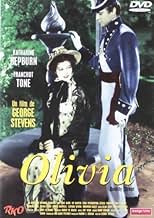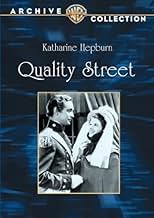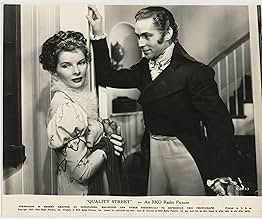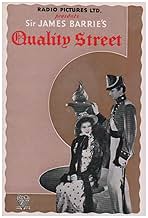IMDb-BEWERTUNG
6,2/10
1354
IHRE BEWERTUNG
Füge eine Handlung in deiner Sprache hinzuIn the 1810s, an old maid poses as her own niece in order to teach her onetime beau a lesson.In the 1810s, an old maid poses as her own niece in order to teach her onetime beau a lesson.In the 1810s, an old maid poses as her own niece in order to teach her onetime beau a lesson.
- Für 1 Oscar nominiert
- 3 Gewinne & 1 Nominierung insgesamt
Sherwood Bailey
- William Smith
- (Nicht genannt)
William Bakewell
- Lt. Spicer
- (Nicht genannt)
Joan Fontaine
- Charlotte Parratt
- (Nicht genannt)
Helena Grant
- Fanny Willoughby
- (Nicht genannt)
Bonita Granville
- Isabella
- (Nicht genannt)
Carmencita Johnson
- Student
- (Nicht genannt)
Payne B. Johnson
- School Boy
- (Nicht genannt)
Darwood Kaye
- Student
- (Nicht genannt)
Florence Lake
- Henrietta Turnbull
- (Nicht genannt)
Helen Lynn
- Girl
- (Nicht genannt)
Lydia McKim
- Schoolgirl
- (Nicht genannt)
Clifford Severn
- Arthur, a Student
- (Nicht genannt)
Empfohlene Bewertungen
"Quality Street" from 1937 stars Katharine Hepburn, Franchot Tone, Fay Bainter, and Estelle Winwood. It's directed by George Stevens, who directed Hepburn later in Woman of the Year.
Hepburn plays Phoebe Throssel, a lovely young woman living with her spinster sister (Bainter) and surrounded by other spinsters who are neighbors in 1800. Phoebe is in love with one man, Valentine Brown -- as is pointed out in the film, other men have come calling, but Phoebe didn't want them.
Valentine, however, is off to the Napoleonic Wars. When he returns ten years later, Phoebe and her sister have opened a school in their home. Phoebe is embarrassed at being so exhausted and believes she has lost her looks. Nevertheless, Valentine wants her to attend the homecoming ball.
Phoebe, trying to prove something to herself, puts on a fancy dress and does her hair differently. When Valentine arrives, she introduces herself as Olivia ("Livvie"), Phoebe's niece. She gives him Phoebe's regrets, but she doesn't feel well. The two attend the ball together, where Livvy is surrounded by men. She believes that she now has a chance of Valentine proposing to Livvy. If only she can stay away from people who can expose her.
James Barrie wrote many plays that were performed by some of theater's biggest stars at the beginning of this century so it's no wonder Hollywood made it as a movie. It still retains many of its play-like qualities.
The character actors -- Bainter, Winwood, Eric Blore, are wonderful. Tone is very handsome though he doesn't have much to do. Though some might disagree, I felt Hepburn was somewhat miscast. Her portrayal of Phoebe/Livvie, though energetic, feels "put on" rather than organic. She was a tremendously strong actress but pulls back here - it doesn't seem natural.
The cast must have had a great deal of patience - Stevens, known as a very nice man, was known for having actors do 40 takes of one scene; it's one reason why Montgomery Clift never worked for him again after A Place in the Sun. He just didn't have the patience for it.
This is a charming, light film that looks stagy, but that shouldn't hurt your enjoyment of it.
Hepburn plays Phoebe Throssel, a lovely young woman living with her spinster sister (Bainter) and surrounded by other spinsters who are neighbors in 1800. Phoebe is in love with one man, Valentine Brown -- as is pointed out in the film, other men have come calling, but Phoebe didn't want them.
Valentine, however, is off to the Napoleonic Wars. When he returns ten years later, Phoebe and her sister have opened a school in their home. Phoebe is embarrassed at being so exhausted and believes she has lost her looks. Nevertheless, Valentine wants her to attend the homecoming ball.
Phoebe, trying to prove something to herself, puts on a fancy dress and does her hair differently. When Valentine arrives, she introduces herself as Olivia ("Livvie"), Phoebe's niece. She gives him Phoebe's regrets, but she doesn't feel well. The two attend the ball together, where Livvy is surrounded by men. She believes that she now has a chance of Valentine proposing to Livvy. If only she can stay away from people who can expose her.
James Barrie wrote many plays that were performed by some of theater's biggest stars at the beginning of this century so it's no wonder Hollywood made it as a movie. It still retains many of its play-like qualities.
The character actors -- Bainter, Winwood, Eric Blore, are wonderful. Tone is very handsome though he doesn't have much to do. Though some might disagree, I felt Hepburn was somewhat miscast. Her portrayal of Phoebe/Livvie, though energetic, feels "put on" rather than organic. She was a tremendously strong actress but pulls back here - it doesn't seem natural.
The cast must have had a great deal of patience - Stevens, known as a very nice man, was known for having actors do 40 takes of one scene; it's one reason why Montgomery Clift never worked for him again after A Place in the Sun. He just didn't have the patience for it.
This is a charming, light film that looks stagy, but that shouldn't hurt your enjoyment of it.
This is a gem!--IF you like stories set in this time period to begin with. IF you like the more sentimental acting style prevalent in the 1930's. And probably IF you're female.
This has some resonance with Jane Austen's Persuasion. For me, it felt as if I'd found a new Georgette Heyer story, and on film! This is set in the Regency period in England. It is both romantic and comedic.
Katherine Hepburn gives another great performance, similar to her Jo March in Little Women. I don't find her acting over the top at all. Franchot Tone is a good foil for her--not a great actor, but pretty hunky. Additionally, it has a lovely cast full of the kind of character actors you see in films like the Greer Garson Pride and Prejudice. In this case, it's Fay Bainter, Estelle Winwood, and other notables giving the film a fey charm.
This has some resonance with Jane Austen's Persuasion. For me, it felt as if I'd found a new Georgette Heyer story, and on film! This is set in the Regency period in England. It is both romantic and comedic.
Katherine Hepburn gives another great performance, similar to her Jo March in Little Women. I don't find her acting over the top at all. Franchot Tone is a good foil for her--not a great actor, but pretty hunky. Additionally, it has a lovely cast full of the kind of character actors you see in films like the Greer Garson Pride and Prejudice. In this case, it's Fay Bainter, Estelle Winwood, and other notables giving the film a fey charm.
Quality Street is a contrived romance, with a small cast, on a set that looks like a play stage, with few visual impacts and in B&W. So, why did we enjoy it so much? The cast, down to the overplayed smaller parts, all does a great job. The ensemble cast brings spirit to even the small parts, the dialogue is clever, and the asides and glances make it fun. We particularly enjoyed the set and period behaviors as great insights on life in the early 19th century. Hollywood did a great job in establishing this period essence through effective use of hints and props. If you like Hepburn, you will enjoy this moral story, with feminine strength in an unforgiving society. Worth a relook!
Delightful comedy of errors. Pheobe (Hepburn) is in love with the dashing Dr. Brown, but alas her love is unrequited. They meet again 10 years later on his return from the Napoleonic Wars. She has wilted under the strain of teaching little children and is self-conscious about her age. On a whim she decides to dress in her former radiant style, and ends up being mistaken by Dr. Brown for Pheobe's niece. They start to court, and from there it's all silly and predictable, but... sparkling dialogue, great acting and wonderful supporting parts (especially the nosy old spinsters at the windows)
On Quality Street, women occupy their time by either witnessing or passing gossip about their friends and neighbors. Whenever there's a gentleman caller, all the neighbors peer out their windows and stare, taking note of how he was dressed, if he brought flowers, and how long he stayed. What else is there to do in 1805?
Katharine Hepburn and her old maid sister Fay Bainter live on Quality Street, and while they primarily socialize with other old maids and gossipers in town, Kate has one particular friend she treasures: the dashing Franchot Tone. She's known Franchot for a year, and when she thinks he's going to propose, the rumor gets spread all over town. It turns out he enlisted in the army instead, and Kate feels humiliated. Ten years later, Franchot comes home from the war. He's a little gray at the temples, and Kate is no longer the blushing beauty he remembers. Can they fall in love again or is it too late?
While it has an intriguing premise, the rest of the film is pretty silly. In order to get him back, Kate throws caution to the wind and acts like a harlot with all the other men in town, and her mischief-making gets a little long in the tooth after a few scenes. It is great fun to see Kate all dolled up, though. She's more beautiful than she's ever looked in her movies, and her flirtations are charming and sweet. I'm fans of both Kate and Franchot, but Fay Bainter was my favorite character in the film. She was unselfish and a wonderful sister, and I wish she'd taken some screen time away from Kate's silliness.
Katharine Hepburn and her old maid sister Fay Bainter live on Quality Street, and while they primarily socialize with other old maids and gossipers in town, Kate has one particular friend she treasures: the dashing Franchot Tone. She's known Franchot for a year, and when she thinks he's going to propose, the rumor gets spread all over town. It turns out he enlisted in the army instead, and Kate feels humiliated. Ten years later, Franchot comes home from the war. He's a little gray at the temples, and Kate is no longer the blushing beauty he remembers. Can they fall in love again or is it too late?
While it has an intriguing premise, the rest of the film is pretty silly. In order to get him back, Kate throws caution to the wind and acts like a harlot with all the other men in town, and her mischief-making gets a little long in the tooth after a few scenes. It is great fun to see Kate all dolled up, though. She's more beautiful than she's ever looked in her movies, and her flirtations are charming and sweet. I'm fans of both Kate and Franchot, but Fay Bainter was my favorite character in the film. She was unselfish and a wonderful sister, and I wish she'd taken some screen time away from Kate's silliness.
Wusstest du schon
- WissenswertesThe Nestle produced chocolates "Quality Street" were named after J. M Barrie's play by their original manufacturer Mackintosh in 1936.
- PatzerWhen Phoebe and Susan are talking about Mr. B., Phoebe is on a chair and Susan is sitting on a sofa a certain distance near a bonnet. But on the following cuts, Susan's sitting position keeps changing so that she is gets closer and closer to the bonnet.
- Zitate
Mary Willoughby: [Goes to the window and looks out] It's that impertinent recruiting sergeant. I passed him on the street yesterday. He closed one of his eyes at me, then quickly opened it again.
[She demonstrates to the other ladies in the room]
Mary Willoughby: I knew what he meant.
[She looks out again and sees the recruiting officer wink at her. She quickly closes the window curtain]
- Crazy CreditsOpening card:
1805 England Quality Street Where a gentleman passerby is an event.
- VerbindungenFeatured in George Stevens (1984)
Top-Auswahl
Melde dich zum Bewerten an und greife auf die Watchlist für personalisierte Empfehlungen zu.
- How long is Quality Street?Powered by Alexa
Details
- Laufzeit1 Stunde 23 Minuten
- Farbe
- Seitenverhältnis
- 1.37 : 1
Zu dieser Seite beitragen
Bearbeitung vorschlagen oder fehlenden Inhalt hinzufügen

Oberste Lücke
By what name was Quality Street (1937) officially released in Canada in English?
Antwort
































